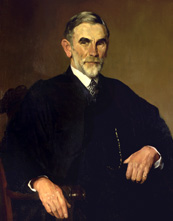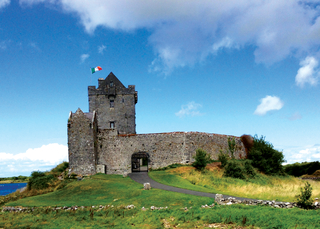
James Ussher was the Church of Ireland Archbishop of Armagh and Primate of All Ireland between 1625 and 1656. He was a prolific scholar and church leader, who today is most famous for his identification of the genuine letters of the church father, Ignatius of Antioch, and for his chronology that sought to establish the time and date of the creation as "the entrance of the night preceding the 23rd day of October... the year before Christ 4004"; that is, around 6 pm on 22 October 4004 BC, per the proleptic Julian calendar.

Athenry is a town in County Galway, Ireland, which lies 25 kilometres (16 mi) east of Galway city. Some of the attractions of the medieval town are its town wall, Athenry Castle, its priory and its 13th century street-plan. The town is also well known by virtue of the song "The Fields of Athenry".

Sir Henry Arthur Blake was a British colonial administrator and Governor of Hong Kong from 1898 to 1903.

Walter de Burgh, 1st Earl of Ulster, 2nd Lord of Connaught also spelt Burke or Bourke, was an Irish peer from the House of Burgh.
This is a bibliography of works relating to the Aran Islands.
The High Sheriff of County Galway was the Sovereign's judicial representative in County Galway. Initially an office for lifetime, assigned by the Sovereign, the High Sheriff became annually appointed from the Provisions of Oxford in 1258. Besides his judicial importance, he had ceremonial and administrative functions and executed High Court Writs.

Helena Concannon was an Irish historian, writer, language scholar and Fianna Fáil politician.
William Reeves was an Irish antiquarian and the Church of Ireland Bishop of Down, Connor and Dromore from 1886 until his death. He was the last private keeper of the Book of Armagh and at the time of his death was President of the Royal Irish Academy.
Louis Michael Cullen is an Irish diplomat, academic, historian, author and Japanologist. He is Professor of Modern Irish History at Trinity College in Dublin. Nicholas Canny has described him as "the most prolific, most wide-ranging, and the most enterprising historian of his generation in Ireland."
Irish genealogy is the study of individuals and families who originated on the island of Ireland.
St George Daly was an Irish judge, who had a reputation for ignorance of the law. He owed his career advancement entirely to his support for the Act of Union 1801, which did nothing to enhance his standing in the legal profession.
Denis Bowes Daly PC, was an Irish politician.
Robert Ponsonby Tottenham was an Irish Anglican Bishop in the first half of the 19th century.

Edward John Gwynn was an Irish scholar of Old Irish and Celtic literature, Provost of Trinity College Dublin from 1927 to 1937 and President of the Royal Irish Academy from 1934 to 1937.
John Bodkin, Esquire. Born the second son of Counsellor-at-law, John Bodkin and Mary Clarke of Carrowbeg House, Belclare, Tuam, County Galway, Ireland. In 1741, John Bodkin, the second son of a landed gentry family in Co Galway, Ireland was arrested on the charge of murdering his older brother, Dominick. He was found guilty of the crime even though he refused to admit his guilt during his trial or thereafter. He was hanged, drawn and quartered in Galway City on Saturday, 20 March 1742.

Peter Martyn was an Irish barrister, landowner and judge. He was one of the Roman Catholic judges appointed to the Irish Bench by King James II, as part of James's policy of creating an exclusively Catholic Irish administration. After the downfall of James' cause at the Battle of the Boyne he was accused of attempting to ingratiate himself with the new regime, but soon afterwards he was attainted. He later fled the country and died in exile.
Anthony Martin was an Anglican priest in Ireland during the first half of the 17th-century.
Giles Eyre (1689–1749) was an Anglican priest in Ireland in the eighteenth century.
Edward Bayly (1709-1785) was a clergyman in the Church of Ireland during the 18th century. He was the son of Sir Edward Bayly, 1st Baronet, an Irish landowner and politician, and Dorothy, daughter of the Hon. Oliver Lambart.
Arthur Stanhope was an Anglican priest in Ireland in the 17th century.






